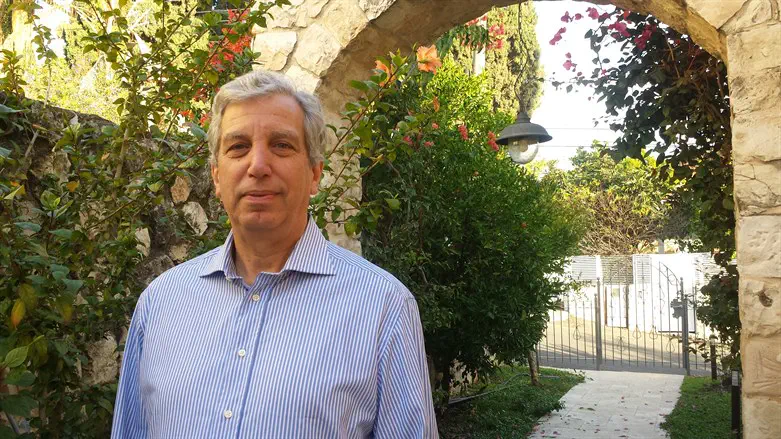
There is a sense of foreboding in the air.
It is not coming from Iran, though justifiable worry persists about the implications of a possible US-driven ineffectual agreement with the Mullahs about the pace of Iranian nuclear development.
Rather, the foreboding is internal, and it focuses on the places that were the subject of the dangerous riots that we saw last May.
Those riots took place while Hamas was rocketing Israel yet again. As challenging as those rocket attacks were, they have become part of the choreography of our dealings with Hamas. What was truly unusual, and, in many respects, far more frightening, were the internecine attacks that rocked several mixed towns and cities.
These attacks were not about Judea or Samaria, nor about other disputed territories. These attacks took place in mixed cities, places that have had mixed populations since even before 1948. In that sense they were reminiscent of pogroms in Europe where Jews had lived with Christians for centuries, only to see the latter turn on their Jewish neighbors with sudden murderous rage.
The May riots were so disconcerting because they called into question a deep seated though often repressed fear of many Israeli Jews: what are the true loyalties of our Arab citizens?
At a time when many polls had been showing that Arab integration was increasingly becoming a reality, especially among younger Arabs, the riots exposed a far different perspective, and a concern that the timing of the riots was not at all coincidental to the Hamas attacks.
In other words, there were fears of collusion with Hamas, at least by certain provocateurs and instigators, and the willingness of even a relatively small minority to go along with the rabble rousers called into question the ability of Arab community leaders to control their people, assuming they were so inclined.
Further complicating the situation was the startled and disorganized reaction by the Police. Their initial reactions were ineffective, prompting the need for other enforcement personnel, and creating the vacuum that was filled by volunteer citizen groups seeking to protect beleaguered Jewish communities.
Unfortunately, the reaction of many local Jews was to lose confidence in the determination and the ability of the Police to defend Jewish interests, and a lingering fear that much the same could happen again.
Now we are moving towards Ramadan at the beginning of April, typically a time for discontent and unrest. The issue of the Sheikh Jarrah (Shimon Hatzaddik) neighborhood is being stoked and there is a fear that, like the reflexive accusations about supposed “attacks” on the Al-Aqsa Mosque (on the Temple Mount), Sheikh Jarrah will be used as an emotional rallying cry that will result in a renewed round of rioting.
There are many questions involved with these fears. One is whether this represents another effort by Hamas, or possibly anti-Palestinian Authority Palestinian Arab groups in and around Ramallah to hit at the soft underbelly of Israeli society; and if so, what larger purpose would these riots serve?
The other is that even if the anger is solely locally engendered, what is its real significance? Is this about grievance, or about control? Is there a growing sense by a significant cohort of the local Arab population that they can harness perceived Israeli weakness for a larger political agenda?
Many Arabs have a great sensitivity to power, and to its absence. They respect power, and they are quite skillful in exploiting what they perceive to be the unwillingness or inability to project it. Unfortunately, conciliation is often seen to be indicative of weakness, and weakness is then meant to be exploited.
Which brings us back to Ramadan. The real question will be how would any perceived exploitation, i.e., riots, be handled by the Government? Our key leaders, most certainly Prime Minister Bennett, must surely know that a muted or accommodative response will only raise the temperature and the ante.
However, those same leaders are also well aware that in the exquisitely delicate balance that is the governing coalition there are more than a few coalition members who will want just that. There will be reflexive self-accusations of pushing the Arabs to such extremes, and, of course, there will be intense condemnations of any on the ground Jewish responses to violence.
We will hear about vigilantism, and comparisons to terroristic settlers, but the targets will be neighborhood residents. Mansour Abbas is likely to do cartwheels to show that he is both against violence, but somehow is sympathetic, if not explicitly supportive of an anti-Israel Arab agenda.
In other words, the Government will be sorely tested, and its credibility might be gravely, even fatally compromised.
Regardless, the greater importance for Israel surely lies in a full-throated rejection of yet another attempt to test our resolve. Khan al-Ahmar stands unmolested; the Bedouins are flexing their muscles with both impunity and even encouragement to assert their land claims in the Negev; and the Arabs of the Galilee have good reason to believe that law enforcement will not affect them.
So, maybe, just maybe, the thinking of those in the Arab community who seek to harm Israel is that it is time to take the “next step.”
We don’t know what the goal of such a next step might be, but it almost doesn’t matter, because exposing Israeli weakness and lack of resolve, would be an end in and of itself.
And that is the essential challenge for our Government to meet: to deliver the clear message that Israeli sovereignty from within is not negotiable, not up for grabs, nor in doubt.
That message, in and of itself, must be the unmistakable take-away from any attempts at violence and disruption. Only such a response will assure that we will be able to live without the continued threat of internal havoc.
Douglas Altabef is the Chairman of the Board of Im Tirtzu, Israel’s largest grassroots Zionist organization, and a Director of the Israel Independence Fund. He can be reached at dougaltabef@gmail.com.